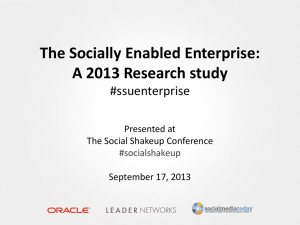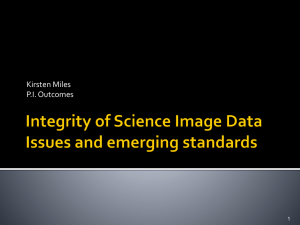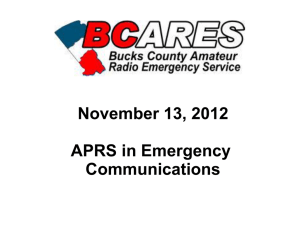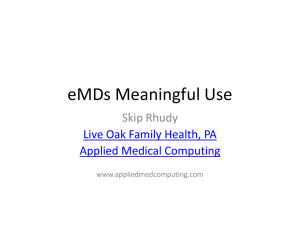Susan Bishop Presentation ppt
advertisement
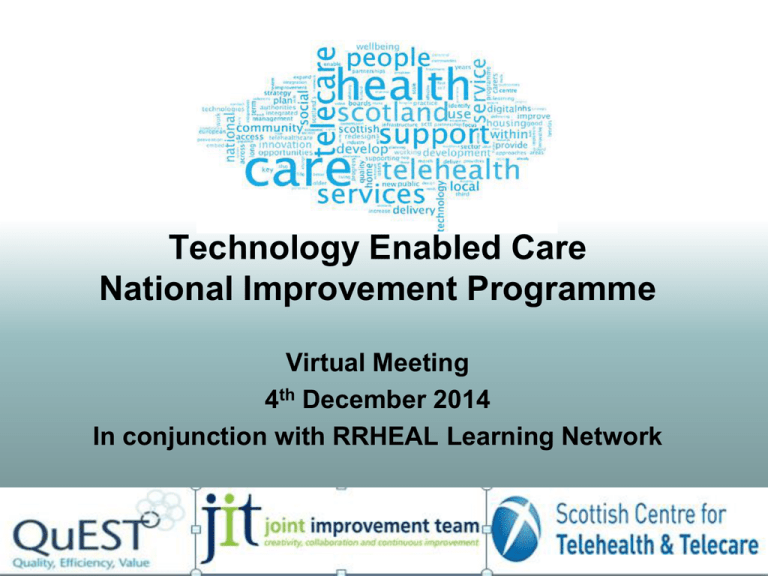
Technology Enabled Care National Improvement Programme Virtual Meeting 4th December 2014 In conjunction with RRHEAL Learning Network Welcome to Technology Enabled Care – Delivering Our Ambitions Improvement Programme Susan Bishop Dr Gordon Black Amanda Leithead Laic Khalique Programme 14:00 Welcome and check in 14:10 Context and progress of TEC programme 14:20 Case example/storyboard : Laic Khalique, NHS Highland Telehealthcare 14:30 What can we achieve through using 30 day cycles of improvement and measurement? 14:40 Q&A’s/Discussion 15:10 Close Session Outcomes You will have the opportunity to: • Describe opportunities for using technology to make services easier for people to access and easier to deliver • Progress towards mutual understanding of what we can achieve through planning and undertaking 30 day cycles of change and measurement for improvement • Share experiences and learning with other teams implementing technology enabled care across Scotland Technology Enabled Care Development Programme Background • Designed to significantly extend the numbers of people directly benefiting from technology enabled care and support; • Benefits from £10 million in funding for 2015/16; • Local areas challenged by the Cabinet Secretary to show how technology enabled care contributes to avoiding unnecessary hospital admissions, reduces length of stay and prevents delayed discharges from hospitals in all locations across Scotland. The overall aim of the TEC Programme is: • To enable greater choice and control in health, care & wellbeing services for an additional 300,000 people by March 2016, enabling more of our citizens to remain at home and in their communities. Technology Enabled Care Development Programme Priority Areas Five priority areas have been identified for expansion of TEC : • Extending the use of home health monitoring; • Expanding use of video conferencing across all health and social care sectors, as well as growing its use for clinical/practitioner consultations; • Building on the emerging national digital platforms including Living it Up and ALISS to enable direct access to advice and assistance • Expanding the take up of Telecare with focus on prevention, points of transitions in care and dementia; • Exploring the scope and benefits of switching from analogue to digital Technology Enabled Care Development Programme Timelines Programme announced, Cab Sec for Health & Wellbeing May 2014 Improvement Programme launched 23 Sept 2014 Programme Board established 3 Oct 2014 Guidance issued to Partnerships with Expressions of Interest invited Oct 2014 Return of EoI – Nov 2014, 44 returns received 5 Workstreams developing identifying Ongoing key activities/deliverables for 14/15 Identification of Key Partners End Jan 2015 A National Telehealth & Telecare Delivery Plan for Scotland 2015 We firmly believe that Telehealth & Telecare can contribute enormously to: • the Scottish Government’s 2020 Vision for our health system – a vision where everyone is able to live longer, healthier lives at home or in a homely setting • integrated health and adult social care as a key policy and strategic priority Technology Enabled Care (TEC) • TEC Delivery Programme Funded £10 million – specific focussed work streams – allocated to successful partnership bids • TEC Improvement Programme ‘Delivering Our Ambitions’ Supportive programme for all Partnerships – supported by QuEST team Technology Enabled Care National Improvement Programme Aim • To increase the number of people using technology to enable delivery of health and social care at home. Objectives • Accelerate spread across Scotland of a minimum of three effective innovations in technology enabled care: home monitoring, video technology and apps /on line resource's • Increase the capacity and capability to deliver technology enabled care in all NHS Boards, integration authorities and their partners • Improve sustainability of technology enabled care within redesigned pathways Technology Enabled Care National Improvement Programme Aim • To increase the number of people using technology to enable delivery of health and social care at home. Objectives • Accelerate spread across Scotland of a minimum of three effective innovations in technology enabled care: home monitoring, video technology and apps /on line resource's • Increase the capacity and capability to deliver technology enabled care in all NHS Boards, integration authorities and their partners • Improve sustainability of technology enabled care within redesigned pathways Technology Enabled Care National Improvement Programme Technology Enabled Care National Improvement Programme Laic Khalique What can we achieve through using 30 day cycles of improvement and measurement? The 30/60/90 day cycles • The programme is structured around the concept of a 30, 60 and 90 day improvement cycles • Each cycle period supported with electronic newsletters, WebEx’s and learning sessions The First 30 days cycle In the first 30 day cycle you would • Identify key leads to support the work within the partnership • Engage key stakeholders • Review the improvement programme aims / objectives / driver diagram • Review stage of readiness and your ambitions • Formalise key measurements for improvement • Identify local barriers / challenges to success • Create an action plan Model for Improvement Measurement For Improvement The aim of improvement in healthcare is to make services better. E.g. • safer (less errors, infections, falls) • more effective (delivering care that is based on science) • more efficient (less waste) • more person-centred (caring, compassionate, fitting with patient/family requests), more equitable • or timely. To understand whether we have reached our aims we need to define what our chosen 'better' state would look like and measure things to know if the changes we make result in the improvements we seek. Possible Measures Increased use of video conferencing technology Utilisation of national VC facility across all sites in 'office' hours Number of clinical face to face consultations Secondary care usage – e.g. Highlands – Paediatrics / tele neurology Primary Care usage Increased availability and use of patient portals Number of GP practices within a Board offering on-line services to their patients and the services provided Number of times the GP Online service/s have been accessed (logged into) (include breakdown of services accessed if known) Number of patients that have made use of My Diabetes My Way. Number of patients that have made use of Renal Patient View Increased number of people receiving home monitoring for health and social care Number of people receiving home monitoring Referral rates Source / reason for referral Increased access to online resources for information / support Living it up / ALISS / Smartcare Analytic info / evaluation info Qualitative feedback from users Measure awareness in Health / Social care providers How are we doing at the moment? Partnership Areas 32 partnership areas Variation in: Geographical coverage ranges from 26 square miles in Dundee to 12,437 square miles in the Highlands Population ranges from under 20,000 people in the Orkney Islands to over 600,000 in the Glasgow City Variation Between Partnerships What will success look like? Key measures: • Increase in the availability / use of video conferences / consultations • Increase in the use of Telecare – e.g. use of Community Alarms • Increase awareness / use of web based resources – e.g. Living It Up • Integration of technology enabled care into ‘normal’ care • Increased knowledge / training of staff to use technology where it is appropriate Technology Enabled Care National Improvement Programme December 2014 Progress So far • Raised awareness of Programme Launch Event – September 2014 – all Partnerships Identification of key Partnership leads • Initial 30 day improvement cycle WebEx's x 3 – different Partnerships Knowledge Hub – increasing community • Planned Local Learning sessions – Nov / Dec Develop understanding of baseline measures What stage different Partnerships are in programme / Storyboards Thank you Resources: https://knowledgehub.local.gov.uk/group/tecdoa http://www.jitscotland.org.uk/ or http://www.sctt.scot.nhs.uk/


